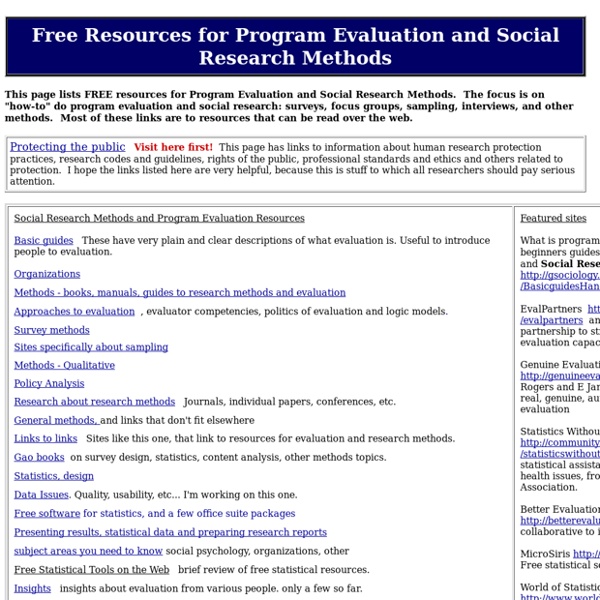



http://gsociology.icaap.org/methods/
Related: Qualitative Methodology • EstadísticaQualitative research In the conventional view, qualitative methods produce information only on the particular cases studied, and any more general conclusions are only propositions (informed assertions). Quantitative methods can then be used to seek empirical support for such research hypotheses. History[edit] Data collection[edit] Qualitative researchers face many choices related to data collection ranging from grounded theory practice, narratology, storytelling, classical ethnography, or shadowing. Qualitative methods are also loosely present in other methodological approaches, such as action research or actor-network theory.
Structural Equation Modeling David A. Kenny January 12, 2014 Structural Equation Modeling Find out about an interesting conference about SEM: Modern Modeling Methods 2015. It's (Beyond) Time to Drop the Terms Causal-Comparative and Correlational Research It's (Beyond) Time to Drop the Terms Causal-Comparative and Correlational Research in Education Burke Johnson University of South Alabama Instructional Design & Development Program Abstract Presentations of causal-comparative and correlational research methods in educational research textbooks are critiqued. The first major contention in this paper is that, ceteris paribus, causal-comparative research is neither better nor worse than correlational research in establishing evidence of causality.
Statistical Inference (and what is wrong with classical statistics) Home Scope This page concerns statistical inference as described by the most prominent and mainstream school of thought, which is variously described as ‘classical statistics’, ‘conventional statistics’, ‘frequentist statistics’, ‘orthodox statistics’ or ‘sampling theory’. Oddly, statistical inference—to draw conclusions from the data—is never defined within the paradigm. Core Concepts § Q: Foundations of Qualitative Research in Education Core Concepts in Qualitative Research In this section, we discuss a number of issues, areas of contention, and concepts that are important to the constantly evolving field of qualitative research. Subjectivity offers a starting point for understanding how a researcher's perspectives, biographies, assumptions, and commitments shape the research process. Paradigms engages with question like what is knowledge, and, as researchers, how do we know what we know? Emic & Etic outlines two general, contrasting approaches to qualitative research. Computer Assisted Analysis frames some of the discussion around new qualitative data analysis software.
HyperStat Online: An Introductory Statistics Textbook and Discussion of whether most published research is false Recommend HyperStat to your friends on Facebook Click here for more cartoons by Ben Shabad. Other Sources NIST/SEMATECH e-Handbook of Statistical Methods Stat Primer by Bud Gerstman of San Jose State University Statistical forecasting notes by Robert Nau of Duke University related: RegressIt Excel add-in by Robert Nau Designing: Foundations of Qualitative Research Designing & Proposing Qualitative Research We start our sections on conducting qualitative research with designing and proposing. These intertwined processes serve as spaces for you as a researcher, along with your colleagues and committees, to plan thoughtfully while considering the major challenges and issues that come along with conducting qualitative research. Some amount of designing must take place before any data is collected – at the very least a researcher should know where they are researching and some general areas of interest.
Statistical Distributions Every statistics book provides a listing of statistical distributions, with their properties, but browsing through these choices can be frustrating to anyone without a statistical background, for two reasons. First, the choices seem endless, with dozens of distributions competing for your attention, with little or no intuitive basis for differentiating between them. Second, the descriptions tend to be abstract and emphasize statistical properties such as the moments, characteristic functions and cumulative distributions. In this appendix, we will focus on the aspects of distributions that are most useful when analyzing raw data and trying to fit the right distribution to that data. Fitting the Distribution
Available Research Designs Based on Example Research Questions – SOBT Quantitative Research Designs Avoid research questions with yes or no answers, as they are not particularly interesting. Qualitative Research Designs Design Science References Good Web Sites These are some of the bookmarks that I think are particularly useful. If you have any that you think that I might add, please let me know. Bookmarks seem to become unavailable on an unpredictable schedule, so there may be some here that don't work. General Statistical Stuff Karl Wuensch's StatHelp page IIER 16: Mackenzie and Knipe - research dilemmas: Paradigms, methods and methodology Issues In Educational Research, Vol 16, 2006[ Contents Vol 16 ] [ IIER Home ] Noella Mackenzie and Sally KnipeCharles Sturt University In this article the authors discuss issues faced by early career researchers, including the dichotomy, which many research textbooks and journal articles create and perpetuate between qualitative and quantitative research methodology despite considerable literature to support the use of mixed methods. The authors review current research literature and discuss some of the language, which can prove confusing to the early career researcher and problematic for post-graduate supervisors and teachers of research. The authors argue that discussions of research methods in research texts and university courses should include mixed methods and should address the perceived dichotomy between qualitative and quantitative research methodology. Introduction Research paradigms
k-means clustering Vector quantization algorithm minimizing the sum of squared deviations We ask you, humbly: don't scroll away. Hi reader. This is the 5th time we’ve interrupted your reading recently, but 98% of our readers don't give. Many think they’ll give later, but then forget. This Thursday we ask you to protect Wikipedia.